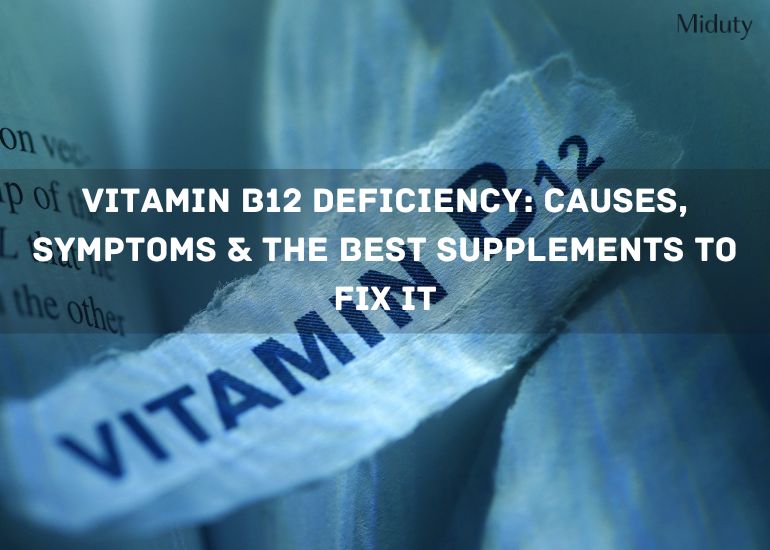
Is Table salt the only Food Rich in Iodine for Hypothyroid? (Read More)
Have you ever had unexpected mood swings, felt constantly drained out, or put on weight suddenly for no reason? I know these symptoms can be demotivating and confusing, and they can indicate a number of different underlying health issues.
Most people who witness such symptoms aren’t aware of the fact that they are suffering from thyroid dysfunction. Hypothyroidism, a condition in which the thyroid gland does not produce enough hormones to control the body's metabolism, resulting in a variety of symptoms including fatigue, weight gain, and depression and is one possible culprit that is frequently overlooked. If you have hypothyroidism, you may have been told to eat foods rich in iodine for hypothyroid such as table salt.
Iodine is a nutrient that the body requires in order to function properly. It is especially important for the thyroid gland's health, as it relies on iodine to generate hormones that control bodily functions, growth, and development. Hypothyroidism affects one out of every ten Indians, and it is more common in women and old people.
Did you know that iodine is a mineral that is essential for the creation of thyroid hormones? Iodine is obtained from the bloodstream by the thyroid gland and used to generate thyroid hormones, which are responsible for managing body functions, growth, and improvement throughout the body. Research published in the National Library of Medicine suggests that without enough iodine, the thyroid gland is unable to produce enough thyroid hormones, resulting in hypothyroidism.
In this blog post, we'll look at some other foods high in iodine and discuss why it's so essential to get enough of this nutrient. By the end of this post, you'll know why iodine is important, where to get it, and how to integrate it into your diet.
How much Iodine do you Need?
The recommended daily iodine intake varies according to age and gender. Adults should consume 150 micrograms (mcg) of iodine per day, while pregnant and lactating women should consume slightly more, up to 250 mcg per day.
It's critical to monitor your iodine intake because too much or too little can be harmful. Excessive iodine consumption can cause hyperthyroidism, while insufficient intake can cause hypothyroidism.
What are the other foods rich in Iodine for Hypothyroid?
Many people seem to believe that table salt is the only dietary source of iodine. Researchers at the National Center of Biotechnology Information reveal while salt is frequently iodized (iodine is mixed during processing), it is not the only food containing this essential mineral. In fact, there are numerous other foods rich in iodine for hypothyroid that can assist you with meeting your daily needs.
It should be noted that the iodine content of these foods changes based on factors such as soil quality, farming techniques, and processing techniques. However, including a variety of foods rich in iodine for hypothyroid in your diet can help ensure that you get enough of this important nutrient.
Iodine must be obtained through your food since the body cannot produce it. Aside from table salt, a number of other foods rich in iodine for hypothyroid can be included in your diet. Here are a couple of examples:
- Ensure seafood in your diet

Researchers at Research Gate state that one of the best sources of iodine is seafood. This essential mineral is abundant in seaweed, cod, and shrimp. In fact, a 100-gram serving of seaweed can supply more than 1,000% of the daily recommended iodine intake. Many cultures consider seaweed to be a staple food, particularly in Japan, where it is frequently used in soups and salads. However, seafood and seaweed are less common in our Indian diets. In such cases, one can look for other foods rich in iodine for hypothyroid which I will mention later.
Fish like cod and tuna are the best foods rich in iodine for hypothyroid.
- Do eat greek yogurt
Greek yogurt has a large amount of iodine, an important mineral for healthy thyroid function, therefore it's one of the best foods rich in iodine for hypothyroid. Greek yogurt actually contains enough iodine in just one serving (6 ounces, or 170 grams) to meet up to 50% of the daily required dose. Research published by the National Institutes of Health reveals that Individuals who have hypothyroidism may struggle to obtain enough iodine through their diet because some items, like seaweed, seafood, and iodized salt, are high in iodine but aren't always consumed or may not be available.
Greek yogurt, on the other hand, can improve thyroid function and help to enhance iodine consumption. It is one of the best foods rich in iodine for hypothyroid if you’re a vegetarian.
- Take eggs periodically

Eggs are yet another one of the best foods rich in iodine for hypothyroid, although in tiny amounts. One large egg contains about 10% of the recommended daily iodine intake. Eggs are a flexible food that can be used in a variety of dishes, from omelets to salads.
While eggs do not contain a lot of iodine, they do contain a lot of other nutrient content that is crucial for thyroid function. Eggs, for example, are high in selenium, which is necessary for the production of thyroid hormones. Eggs also contain vitamin D, which might also help with thyroid function and is essential for bone health.
- Regular vegetable intake is important for hypothyroidism
Researchers at the National Center of Biotechnology Information say that Iodine is also found in vegetables mostly cruciferous vegetables. As an example:
Baked Potato: Baked potato with skin contains approximately 60 micrograms of iodine.
Broccoli: Broccoli is a cruciferous vegetable that is high in iodine, with one cup of cooked broccoli providing about 6% of the RDA.
Spinach: Spinach is a leafy green vegetable that is high in iodine, with one cup of cooked spinach providing about 7% of the RDA.
Brussels sprouts: Brussels sprouts are one of the best cruciferous foods rich in iodine for hypothyroid, one cup of cooked Brussels sprouts contains about 6% of the daily recommended allowance.
- Including dietary supplements is a wise choice
Iodine supplements can be an excellent source of iodine for individuals who are in danger of iodine deficiency or who need extra iodine to assist thyroid function.
Iodine supplements are frequently suggested for individuals who do not eat enough foods rich in iodine for hypothyroid, such as vegans or vegetarians, or who live in regions where the soil is deficient in iodine. Iodine supplements can also help pregnant and breastfeeding women.
Iodine deficiency can cause hypothyroidism, goiter, and intellectual disabilities in babies born to iodine-deficient mothers during pregnancy.
Overall, when it comes to thyroid health, it's essential that you choose high-quality supplements that are safe, effective, and supported by scientific evidence. Don't compromise the quality of your thyroid supplements because it can have an adverse effect on your health and well-being.
A Supplement that contains iodine from natural sources like Sea Kelp along with other important minerals like selenium and zinc can help to compensate for the iodine deficiency and help in maintaining healthy thyroid function.
Conclusion
While iodized salt is a common source of iodine, many other foods, including seafood, dairy products, eggs, fruits, and vegetables, are also foods rich in iodine for hypothyroid. Iodine requirements vary by age and gender, with adults needing 150 mcg per day and pregnant and lactating women needing slightly more.
Supplements and meals that have been fortified with iodine are other ways to get iodine. This can be particularly important for those who live in areas where the soil is low in iodine or who do not consume foods rich in iodine for hypothyroid, such as seafood or dairy products.
The recommended daily intake should be followed, it is essential to remember that too much iodine can have negative effects on health. So, whenever choosing an Iodine supplement for your thyroid health, choose carefully!
However, it is critical to be aware of the iodine sources in your diet and to seek advice from a healthcare professional if you have any concerns about your iodine intake. Too much or too little iodine can be harmful and lead to health problems such as hyperthyroidism or hypothyroidism.








